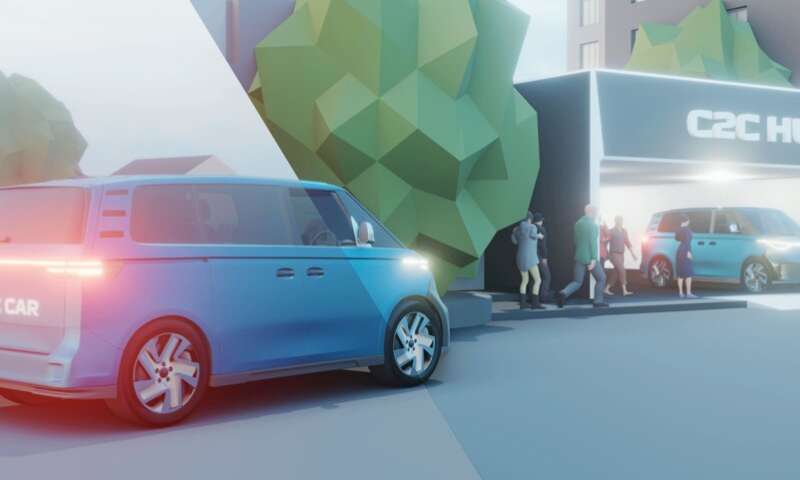Public passenger transport: Efficient services for commuting between urban and rural areas

Living in rural areas and working in the city is a challenge for many people. Seamless and efficient transport systems are still rare in rural areas. Often, they are no alternative to the private car. Sustainable and attractive transport services between the city and its rural neighborhoods are now in the focus of the Country to City Bridge (C2C Bridge) project of the German Center for Future Mobility (DZM) in Karlsruhe.
The project coordinated by Karlsruhe Institute of Technology (KIT) covers public passenger transport services with autonomous taxis on call and smart interchange hubs. Apart from technical aspects, researchers want to study acceptance of new mobility technologies by society.
"For maximum acceptance on the way towards sustainable mobility, we need convincing, effective, and seamless solutions for commuting between urban and rural areas," says Professor Oliver Kraft, Acting President of KIT. "The interdisciplinary and interinstitutional approach of C2C Bridge helps develop such solutions."
"C2C Bridge pools the competencies of long-standing partners for the development of concepts and the corresponding technical solutions. The needs and feedbacks of users are considered from the very beginning," notes Professor Thomas Hirth, KIT Vice President Transfer and International Affairs.
"The well-developed public passenger transport system in Karlsruhe is the basis for sustainable mobility in the city and its rural neighborhoods," Dr. Frank Mentrup, Lord Mayor of Karlsruhe, adds. "Now, other services have to be integrated. C2C Bridge is a promising approach to reaching this goal. We are happy to be among the pioneers again."
Autonomous mobility services meeting with high public acceptance
In daily commuter traffic in Germany, a car has an average number of 1.1 passengers only. The area and energy required and the resulting CO2 emissions per person are accordingly high. Under C2C Bridge, researchers study how the current gaps in public transport services can be closed.
"We want to find out which aspects and which degree of individualization make people change their mobility behavior," says Professor Frank Gauterin, Head of KIT's Institute of Vehicle Systems Technology and Spokesman of the C2C Bridge consortium.
The project is aimed at developing mobility services meeting with a high public acceptance and based on new, automated vehicle concepts and their interconnected operation. Automated shared taxis on call will offer efficient rides in rural areas. They are to have sufficient space for up to four persons, a wheelchair, a pram, and baggage. On the outskirts of the city, interchange to conventional public passenger transport systems or alternative transport means, such as rental bikes, will be possible. In this way, rural areas will be linked to the city.
"The vehicles will drive in convoy, called platooning, in case of heavy traffic. This will minimize space consumption and improve safety and efficiency," Gauterin says.
Analysis of the society's mobility needs
To develop need-based solutions, researchers are in close dialog with all stakeholders.
"To obtain a differentiated understanding of the mobility needs in the city and its rural neighborhoods, we will talk to citizens, potential operators, urban planners, and vehicle manufacturers," says Professor Peter Vortisch, Head of KIT's Institute for Transport Studies. The C2C Bridge researchers will also introduce various vehicles and infrastructures. Based on the analysis, they plan to develop and construct prototypes of vehicles and interchange hubs in the second project phase
"The transport services will be developed taking into account the feedback of users. In this way, optimum connection of the city to its rural neighborhood can be studied," Vortisch adds.
KIT has initiated C2C Bridge. Altogether, twelve KIT institutes are involved. KIT's consortium partners are the FZI Research Center for Information Technology, an innovation partner of KIT, the Baden-Württemberg Institute for Sustainable Mobility at Karlsruhe University of Applied Sciences, Fraunhofer Institute for Chemical Technology ICT, Fraunhofer Institute for Systems and Innovation Research ISI, and Fraunhofer Institute of Optronics, System Technologies, and Image Exploitation IOSB. These Karlsruhe mobility research institutions form the Research Cluster KAMO: Karlsruhe Mobility, in which they have been cooperating in a number of projects since 2016.
C2C Bridge and the German Center for Future Mobility
The Country to City Bridge—C2C Bridge project started in early 2024 and is scheduled to run until 2027.
The project is embedded in the German Center for Future Mobility (DZM). With its four offices in Hamburg, Annaberg-Buchholz, Minden, and Karlsruhe, it represents a Germany-wide research network and pools vast mobility research expertise. Within the framework of the projects and beyond, a number of events is organized by the different DZM offices to communicate findings to politics, industry, and society and to enhance cooperation. Annual conferences, seminars, and winter schools foster the exchange of researchers. Continuous coordination of the projects on working and executive levels creates synergies and helps assess project findings for transferability.
Provided by Karlsruhe Institute of Technology